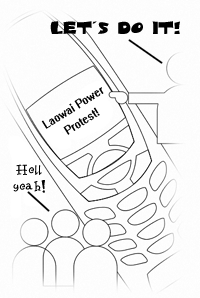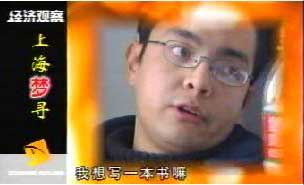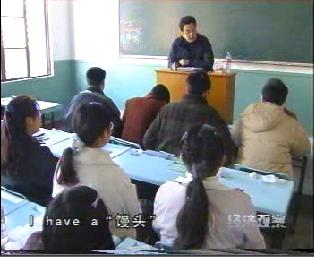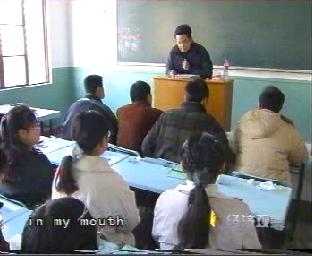11
Apr 2003New DVDs
Made a little DVD run today. We buy pirated DVDs for 7rmb each (less than US$1). I bought pretty much only Chinese and Japanese stuff. The Chinese movies are mostly fluff. The Japanese movies were several of Miyazaki Hayao‘s classic animated films. Two of the Chinese movies I got mostly because the covers made me laugh. Keep in mind that since these movies are pirated — and in many cases released before the real DVD has even been released — the pirating companies have to design their own covers. Usually they just steal images from advertisements, but occasionally you see something original or weird, and you see a lot of bad English. I picked up two DVDs that I’d like to mention, although I haven’t watched them yet.

Flowers of Shanghai (海上花).
This one is apparently critically acclaimed. What caught my eye was a line at the top of the cover: PROSTITUTE MOVIE COLLECTION (Chinese: 青楼名妓电影系列). I know there are some movies about prostitution, but there’s a prostitute movie collection?! Kinda funny. The movie is about the late 19th century Shanghai brothel business.

Looking for Mister Perfect (奇逢敌手).
I don’t have high expectations for this movie. I’m thinking it’ll be popular because it’s one of Shu Qi’s new ones. The graphic the pirates used for the cover design is such an obvious ripoff of the The Fast and the Furious design that it’s embarrassing. What was funny was the English description on the back. Here it is, verbatim:
> The bright and red-blooded woman fucks the small of earnes t to work, however lack the confidence to love.Although have to warmly pursue, however dream of to launch the love with white dress man of in a dream.A time an d outside swim consumedly horse insid e,small The white dress man, of the to p in a dream however is the evil-foreb oding dream’s beginning.Advertise co mpany Chen to living, and superficia lly is aMissile that wet businessma n, carry on the back the to howev er make with big Poon to navigat e the electronics spare parts to def end the system bargain.Check the b lack dragon spy of this case the Alex, and mistake small for the party, at a the round pursueThe empress, small c ooper ates with hims, and the Poon fina ly catch.Two people with each other living the cordiality… the…
OK, I know it ends in an ellipsis, but that’s really the whole thing. Amazing, is it not? It left me speechless.
Shu Qi
Shu Qi, as I mentioned above, was probably a big draw for the viewers of Looking for Mister Perfect. She is really popular in China right now. She’s in ads everywhere (red bean soup in a can, shampoo, long underwear… you name it!), and stars in movie after movie. One of her most recent big hits was So Close.
She’s obviously popular for her good looks, but what’s interesting is that she got her start in the soft porn industry. Predictably, a lot of Chinese girls hate her. Meanwhile, guys everywhere go gaga.
I got some comments on Looking for Mister Perfect from a Chinese discussion board. Interestingly, they’re bilingual. Excuse my hasty translation.
> adult (2003-4-10 5:58:01): shu qi is very sexy, I saw her early nude movie, she is good.
> 输棋 (2003-4-4 8:49:07): 真不明白,怎么这么多人喜欢她?不过既然有人会如此捧林青霞,答案也就很明显了,输棋不好看,但还比林青霞好 [I really don’t get it — how can so many people like her? But there are also people that are similarly crazy over Lin Qingxia — the answer is obvious. Shu Qi isn’t good looking, but better than Lin Qingxia.]
> agree (2003-4-3 10:44:03): yes, I share the same view with su qi, and I would love to slap those who thinks 舒淇 [Shu Qi] has the looks, 舒淇 [Shu Qi] is as attractive as a toaster.
> su qi (2003-4-3 9:16:33): I do not understand the popularity of shu qi. She plays the exact same role in every one of her movies.
If I had to choose an actress that’s been in some of the more erotic-type movies, I’d go with Christy Chung (钟丽缇). I’ve seen I’ve heard about some some pretty racy flicks of hers, like Jan Dara (晚娘), a twisted tale of a Thai family’s ruin, and Samsara, a story of Tibetan monk’s bout with temptation.
05
Apr 2003Another April Fools' Day
Another April Fools’ Day has come and gone…. Yes, April Fools’ Day is celebrated in China, but in a somewhat different way. In the USA, it seems like pranks are the most popular way of celebrating the holiday, but in China college students just seem to like to fool their classmates. Some of the more common tricks include:
- Calling up a friend and confessing your love for him/her. A variation of this may be telling a friend that another mutual friend has a secret crush on them.
- Calling up a friend by cell phone and telling him you have come to visit and are at the school gate, so the friend should come out and meet you immediately.
Notice that I didn’t mention the classic “loose salt shaker top trick” or “whoopee cushion.” It seems that plain old lies are the way to go here (although you can actually buy whoopee cushions here, for cheap!).
I didn’t really do anything for April Fools’ Day. I guess I’m getting old. I didn’t have class that day, so I slept in. I woke up to the sound of an SMS message arriving on my cell phone. It was from a student saying that his class couldn’t have class the next day because they had their “Spring Outing” (a Chinese college freshman tradition; chun you — 春游 — in Chinese). Well, having just woken up, I was in my usual morning state of dopiness. I had no idea what day it was. So I fell for that. Oh well.
Some news for China April 1st was the death of celebrity Leslie Cheung (Zhang Guorong — 张国荣). He was famous for playing gay roles in movies, such as Chen Kaige’s Farewell my Concubine and Wong Kar-wai’s Happy Together (Ray‘s favorite). Apparently he was gay in real life, too, and committed suicide over love problems. Sad. At first I thought it was a fake April Fools’ Day “news” story, but it’s real.
Does the world know that there are openly gay stars in China? If you have a class discussion on homosexuality here, these names will come up. I think the gay celebrities are mostly confined to Hong Kong, though. (I’m no authority on Chinese celebrities — I’m lucky if I can keep my Chinese friends’ names straight, much less the celebrities’!) It’s pretty clear, though, that for most of mainland China, being gay is still not OK.
31
Mar 2003Outfit Streaks
I overheard a comment from a female student to a male student before class last week: “Hey, you finally changed clothes!” I didn’t want to laugh, but I was just totally cracking up inside. It was one of those “totally China” moments.
So what’s the deal? Put simply, Chinese people often wear the same outfit for several days in a row. At first I found it strange, but before long, I was adapting to this aspect of culture. Allow me to demonstrate pictorially:

Clearly, this is not a cleanliness issue. Americans frequently wear an outfit for one day, then put it away, “clean,” ready to wear again some day in the undefined, not-overly-soon future. Why can’t we just keep wearing the same outift? Cultural programming. If we wear the same outfit for several days in a row, people might think that we don’t actually have a huge wardrobe. People might think we’re poor! Even if we were to have only 5 outfits, we would cycle them meticulously.
But in China you can wear the same thing for several days in a row, and it’s cool. No one will really look down on you for it (although they might comment if you overdo it).
I kinda like this, being free of a cultural chain that, until China, bound me without my knowledge….
27
Mar 2003Pictures, pictures, pictures…
I’ve really let putting pictures online slide. (Remember those Yunnan photos I’ve been meaning to get online for over a month now?) Well, I finally did a little catching up, and further integrated Racingmix‘s photos with Sinosplice’s. The mirroring continues.
> Yunnan Photos are finally online — two pages of them. Story to follow.
> ChinaTEFL Linhai Trip Photos from last weekend are also online now.
Check out the photo album page for updated Racingmix mirror links and some Japan picture links as well. I’ll do more work on those pages at a time when I’m less lazy.
22
Mar 2003Foreigner Protest in Beijing

Did you hear about this story? “Foreigners in China Stage Small Anti-War Protest” from washingtonpost.com. There are several things about this article I find interesting.
First, the protest consisted of “several dozen foreigners.” In a city of millions of people, only “several dozen foreigners” had the balls to protest a war that pretty much all of China disagrees with?? To be fair, it’s true that the foreigners won’t get in nearly as much trouble (if any) for protesting, whereas any Chinese participants would probably face real repercussions. Still, I think it’s funny, imagining a group of foreigners protesting in Beijing. I wonder if they did it in Chinese or English… Also, it’s kind of funny that the “brief protest” was pretty much over as soon as it began. But still, I admire and support the protesters. It should be done.
Second, the protest was “organized through mobile telephone text messages.” Too funny. Anyone who’s been in Eastern China for very long knows how widespread the phenomenon is (see Wang Jianshuo’s take on it and the Sinosplice poll related to it). So of course foreigners are in on the cell phone texting too. But organizing protests by SMS? I can just imagine someone, all justly fired up over the war, angrily typing in, “5-5-5 3-3 8 1-1-1 7-7-7-7 (LET’S) 7 7-7-7 6-6-6 8 3-3 7-7-7-7 8 (PROTEST)….” You get the picture.
Last, China “has not allowed public anti-war protests for fear of harming ties with the United States.” Wow. I’m impressed by that. I’m not saying it’s good to suppress peaceful protest, obviously, but I appreciate Beijing’s commitment to good relations with the U.S. There are some prudent people in power over here. It’s a stark contrast to what’s passing for leadership on the other side of the world in certain superpower nations.
But I’ll end by saying that I support those protesters in Beijing, even if I find the story a bit comic. And while I’m not happy with the decisions made that put them there, I support the allied troops of the U.N.-defying nations who are now serving their countries on Iraqi soil.
21
Mar 2003A Semester in Review
I’m here in China to get really good at Mandarin Chinese. Fortunately, I also enjoy teaching English, since I’ve been doing it for going on three years now. I’m really interested in applied linguistics, so to me teaching is more than just a source of income. It’s research. (Warning to the short of attention span: the following long post is going to be solely about teaching English in China.)
At the end of each semester, I always evaluate how the semester went. Did my students learn anything? Did I stimulate their interest as well (in other words, was class interesting)? Are they likely to remember anything I taught them that semester? Did the grades I gave really reflect the increase in their spoken English proficiency?
These are some hard questions, ones that I think many casual backpacker English teacher types don’t give a second thought to. It’s understandable, if they’re only going to be in China for one or two semesters. But I really care about these answers, personally and intellectually. To help me answer these types of questions about my classes, each semester I have my students answer an anonymous questionnaire in class. I use the results when making decisions about how to modify my class for the next semester.
Last semester class grading was mostly discussion-based, although there were only 5 iscussions. Discussions were student-led. Student discussion leaders also had the responsibility of coming up with their own thought-provoking discussion questions.
The following are the questions I asked my students and some of the answers I received (in the students’ own words, mistakes and all).
1. What did we not do enough of in class?
- watch movies
- play more games
- we should have class outside
- We didn’t talk enough to you!
I was surprised that a lot of students felt that they didn’t have enough direct interaction with me. I strive not to be one of those “spoken English teachers” that just talks the whole class. If the students are to improve their speaking ability, they must do the talking in class. Maybe I overdid it though? It’s the first time I ever got that remark, and I got it from quite a few different students.
More movies and class outside are typical suggestions, but they can only be practically realized (and justified) to a very limited extent.
2. What did we do too much of in class?
- Laughing
- We made too much jok
- I think some of the discussions are very good, but some are meaningless. We can’t improve our Oral English speaking ability by discussions. We learn little things, maybe none.
- The class is all about discussion, it is boring.
The last two comments are the kind I take seriously. The only problem is, from a linguistic standpoint, very often the students have absolutely no idea what they’re talking about. Students who don’t like discussions often propose more one-on-one interaction with me. In a class full of students, however, that’s just not practical. I have to go by the wisdom I learned at UF’s ELI: “divide the class, multiply the talking.” That means they interact with each other more than me. But it gives them more speaking practice.
The complaint about too much discussion is just ludicrous. I think five 30-minute discussions, spread out over 16 weeks of class, hardly qualifies as overdoing it.
3. What did you like about the discussions?
- They’re always interesting.
- Great, wonderful, interesting.
- Through the discussions, some unfamiliar classmates become familiar.
- The topic is usually very interesting so most of us like it. we learn new and good ideas from others at once our English are improved. It’s helpful.
Here a problem with the questionnaires becomes apparent. The students’ feedback is often completely contradictory! When my ideas are based on sound linguistic principles and legitimate pedagogy, though, I tend to listen more to the positive feedback than the whiners.
4. What did you dislike about the discussions?
- I dislike the discussions which are boring and tedious.
- I don’t have enough time to talk with our dear John.
- We don’t know whether our sentences are correct.
- For example sex. I think it is not good for us.
- We are too young to say such sexy topic.
Complaints about class being boring are typical. Many students expect foreign teachers to be singing dancing game-playing clown entertainers (and some of them do fit the bill). Compared to most of their other classes, just about any spoken English class is a nice breath of fresh air for Chinese students, but they still complain.
The sex complaint is an interesting one, because I debated myself whether I should devote a discussion to the topic of sex. It went really well, though.
5. Any other comments?
- No other comments, the class is much more interesting and funny than other courses.
- Actually I like your class best. Because it is very interesting. And you are a very good teacher.
- The atmosphere is too serious espaciouly when we have oral quiz. You shouldn’t be so rigid on the examination and the scores.
- We should not have examination.
- You’re an awesome guy. : )
- I think you are very handsome, also a good teacher.
- John is a good teacher. warmly and kind-heart. Oral English lesson is active class. But the class time is too short.
- You are the best teacher and very lively.
- The class has a little boiling so I want teacher to make it more interesting. Can have class outside and play much.
- On the whole, John’s classes are interesting and lively, full of excitement and joy. We have been looking forward to Friday and your classes.
- You are a lively teacher, I like your style. Could you communicate with us after class, We could talk more and discuss. I think that would improve our English level greatly.
- I can’t understand why you forbade us to speak Chinese you know, sometimes speak Chinese will make thing more comfortable some words we must speak Chinese to express ourselves. It is true that in English class English is the language we should speak, but Chinese is also useful. So I hope you will not forbade us to speak Chinese next term.
- This course is useful and I like it very much. : )
- I think the class doesn’t do much to improve my English.
- Useful English, not useless playing.
- I love you.
OK, so I never said I couldn’t use my own blog to boost my ego. Hehe… Sometimes students can leave harsh comments, so all the positives provide a nice balance. Again, there’s so much conflicting feedback, but I think doing questionnaires is definitely worthwhile. I highly recommend it to any TEFL teachers who are trying to improve their teaching methods.
14
Mar 2003Friends and Pics
In the past I have done a little introductory mug shot page for the English-teaching foreign teachers here at ZUCC. This semester Wilson did it. It’s hosted on his site, but since his site is blocked in China and mine isn’t, it’s also mirrored on my site. Check it out! I’m sure I’ll be mentioning these people on here in the future.
During his time here, Wilson has gotten really imaginative with his photography and web design. I envy his creative eye, his Photoshop skills, his awesome camera. Even if these talents don’t rub off on me, though, at least I can enjoy his results. Don’t miss: Jade Emperor’s Hill [mirrored], Viewing Fish at Flower Pond [mirrored].
I mentioned recently that I’ll be on TV in China March 22nd. Being on TV is a pretty common occurrence for foreigners living in China. Frequent readers/commenters of this blog will be familiar with my friend Ray. He was on TV in Shanghai some months ago when he still worked there. They did a bit of a bio on him. Anyway, he sent me some vidcaps of his 10 minutes of glory, and I think they’re pretty funny, so I’m sharing them. I don’t think he’ll mind everyone having a look at his studly countenance. If he ever put up a site of his own, I’m sure he’d put these pics up.

“So I want to write a book, right? …”

(That’s mantou, a kind of Chinese bun.)

What a fascinating lesson, eh? The students are riveted!
Speaking of commenters on Sinosplice, “Prince Roy,” a rather new regular commenter here, now has his own blog too. Check it.
10
Mar 2003You gave your life…
> You gave your life to become the person you are right now.
Was it worth it? –Richard Bach
Few quotes get me thinking these days like this one did. It’s easy to blow it off without pondering it, but I found it a very worthwhile rumination.
I found the quote in a blog called imo. Interestingly, two of the four quotes on that page are also on my quotes page. (Not the one above, though.) Good quotes.

I became familiar with Richard Bach in high school. I found Jonathan Livingston Seagull rather forgettable, but I loved Illusions: the Adventures of a Reluctant Messiah. Truly high-octane fuel for the imagination.
It’s often said nowadays that where creativity is concerned, China is a huge gaping void. What has China invented lately? Even books like Richard Bach’s seem to echo the philosophies of a China of lore — so distant, but certain as last night’s forgotten dream. Sure, joining the WTO is good times and fun for all, but in modern China, how can even the will of 1.3 billion parched minds revive creativity’s corpse?
05
Mar 2003Rensheng AB Ju
Yeah, I’m not even going to try to translate this one. Rensheng AB Ju is the name of a television show here in Zhejiang. On this show the beginning of a story is told by video to the audience, then stopped, and the watchers are given two choices: A and B. Which should the person take? The three guests (usually of minor fame) are then asked by the host which choice they think is best and why. After that a few guests from the studio audience are asked their opinions. Then the story continues to the next juncture, another A/B choice is presented, and so on. (For the Chinese-inclined, here’s an introduction in Chinese.)
I bring this show up not because I like it (I’ve actually never seen it), but because I was on it. Filmed it last Tuesday. I was a little nervous about being on the show. It was all in Chinese, of course. What if I didn’t follow the story completely, or what if the discussion took a difficult turn? I’d rather not look dumb on TV, if possible. The man on my left was a psychologist (I think) and professor at Zhejiang University, and the woman on my right was an author. My sole qualification was being a foreign teacher in China. The topic was one particular woman’s extra-marital affair.
The show actually went pretty well, I think. I understood pretty much everything, and the host was very easy-going and easy to understand. The psychologist guy busted into some pretty esoteric stuff now and then, dropping all sorts of chengyu, and at those points I was always afraid they would turn to me and ask, “and what do you think about that?!” but that didn’t happen. I talked less than the other two, but that’s pretty understandable. What I did say I communicated well enough.
The show airs on the Zhejiang Satellite TV Station (Zhejiang Dianshitai Weixing Dianshi), Saturday, March 22nd, 9:45pm, and then again Sunday, March 23rd, 11:40am and 3:52pm. This is the fourth time I’ll be on TV in China, I think, and this time instead of chancing into it they came looking for me. Interesting stuff happens to you when you’re here long enough…
05
Mar 2003浙大第三
我来中国以来一直很想知道在中国大学其中哪些大学最好。最近Chuck的blog有答案。是这样:
1. 清华大学(北京)
2. 北京大学(北京)
3. 浙江大学(杭州)
4. 复旦大学(上海)
5. 华中科技大学(武汉)
6. 南京大学(南京)
7. 武汉大学(武汉)
8. 吉林大学(长春)
9. 上海交通大学(上海)
10. 中山大学(广东)
哇,浙大是第三名!不错。以前我跟我的朋友雷雷讨论过这个问题:浙江大学好还是南京大学好?雷雷总是说在各个方面南京比杭州好,包括大学。我都不理他因为杭州没有他说的那么差劲。我才有办法向他证明在这个方面杭州好。
我觉得有意思的是中国北方人老以为北方比南方有文化。那么为什么在中国最优秀的大学其中北方只有三个呢?我不得不承认北京是有中国最好的两个大学,但我还 以为北方应该有更多的。对这个问题我特别有兴趣因为下个学期我想再当学生,很认真地学中文。到现在我在中国从来没有上过中文课。对我来说好象自学的进步是 有限的,我想再上学的时间到了。所以我要考虑去哪里上中文课比较好呢?我知道北京的大学最好,最有名,那边的普通话最标准。可是我真的不想住在北方,也不 想学北方的口音。还好南方有这么多好大学。
02
Mar 2003New semester, New music
> head like an empty sterile room, somehow I made a mess
like watching newborn babies crack from work-related stress
-Alkaline Trio, “I lied my face off”

Well, it’s the beginning of the semester, a fresh start. New students, new teachers, new lesson plans… Somehow it all seems a little “messy” though. I wonder if it’s because of the constant rain. We actually had nice weather today, but that’s a rarity. The other day I accidentally said “rain forecast” instead of “weather forecast.” Hangzhou winters are like this. Lots of time spent indoors. I’m looking forward to the spring…
Lately I can’t stop listening to this song. This one and this one aren’t bad either. I’m not exposed to a lot of new music these days, so when I find something new I like, I’m all over it. I have access to internet radio, but it usually spews the same garbage across the internet as it does across the airwaves at home. I’m happy I found Dashnine Radio. Rarely have I found a station that plays so much stuff I like. Atom and His Package, Screeching Weasel, and The Transplants, all on the same station? I’m there.
[Note: These MP3’s will be online for a limited time only, so if the links have gone dead, that’s why. To see what music I’ve got online at any given time, go to www.sinosplice.com/music/.]
28
Feb 2003"China – The Real Facts"
[Lifted from Dave’s ESL Cafe. Non-italicized, non-indented comments by me.]So, you’re thinking of coming here to teach. Know this advance.
1) With some rare exceptions, your salary at 90% of schools will be no more that $500 US dollars a month, if that. Many schools pay far less than this. China is a poor country. Your accomodation is likely to be on par with what the Chinese themselves would have – a real shocker, by any standards.
This is mostly true. Pay is that low. Accomodations, however, can sometimes turn out to be “a real shocker” for the opposite reason. This was true for me, Wilson, and Jay Peterson (a guy I met in Yunnan).
2) Outside of the modern cities, the Chinese have disgusting personal habits and most provincial cities are filthy shitholes. The Chinese (men and women) spit everywhere and constantly. They piss on the streets and I have seen them shit behind walls. Unless you have a very strong stomach, you may find yourself throwing up. I am not making this up, by the way.
OK, this is based in truth, but it seems exaggerated. You do see public urination a few times a month if you go out, but I have yet to see public defecation.
3) By western standards, they have no ‘manners’. They push and shove. They scream ‘Hello’ at you, snigger and then run away. They stand behind you in Internet cafes – groups of them – and watch your screen. They have no concept of privacy.
Once again, based in truth, but garnished with a liberal helping of culture shock, it seems. Still, the pushing and linelessness is definitely hard to get used to.
4) North of Guanzhou (ie: 90% of China), prepare for savagely cold winters and blisteringly hot summers, untempered by humidity).
Pre-Yunnan me actually wondered if anywhere in China actually had pretty good weather year-round. Now I know.
The people are basically very kind and friendly, but not in a reserved, western way. This is a great country to experience ‘life’, but bear in mind what I’ve said. Personally, I can deal with the downside and am enjoying my experience, but many would not. Nothing personal, but my remarks are objective and I hope, helpful.
Posted: February 19, 2003
I think this is post is a good demonstration that there’s no such thing as objective remarks on China, but it’s a good read and certainly represents how a decent-sized portion of the West would view China.
26
Feb 2003怪物眼睛
 中国人,我求你们–不要买彩色隐形眼镜!!!你看这个照片。好看吗?当然不好看!好看个屁!我觉得亚洲人染头发偶尔会好看。但彩色隐形眼镜呢?不可能!我还是觉得自然的颜色最好看。
中国人,我求你们–不要买彩色隐形眼镜!!!你看这个照片。好看吗?当然不好看!好看个屁!我觉得亚洲人染头发偶尔会好看。但彩色隐形眼镜呢?不可能!我还是觉得自然的颜色最好看。
有时候中国人会问我:“为什么你没有蓝眼睛?”好象他们以为因为我的头发是黄色(其实也不是黄色…),我的眼睛也应该是蓝色。但我这样是天生的。我才不要 蓝眼睛!棕色最好看,给你一种温柔的感觉。蓝眼睛好看是好看,但给你一种冷清的感觉!中国人应该很高兴他们都有天然的最好看的颜色眼睛。反正我很高兴我有 棕色眼睛。
我也
染过头发,但我还是觉得天然的颜色好。(人家也这么说。)
21
Feb 2003Random News
Man, lately I’ve been bad about responding to any e-mails, writing in my blog, and reading anyone’s blog. I also have tons of pictures from Yunnan that I want to get online. (Despite my whining, I actually took a lot of pictures, and a lot of them are decent.) But the school semester starts Monday, and my new job as ZUCC foreign teacher liaison has already begun. I’ve been running around today doing stuff for that, and I’m going to the airport tomorrow to meet one of the new teachers. In addition, there are a few other things I’m really happy about this semester: (1) I only teach 14 hours, (2) I have no classes Fridays or Tuesdays, (3) my largest class size is about 22 now, as my 30 student classes have been split in half (at my repeated urging). Same amount of class time for each student, but less students per class. That means class is easier to teach, and the students get more out of class. Having lots of foreign English teachers (12 total this semester) is a very good thing.
Alf was here in Hangzhou for a visit Tuesday and Wednesday. Unfortunately winter is not the best time of year to witness “the beauty of Hangzhou,” but we had a pretty good time anyway. It was pretty funny how whenever he told Chinese people here that he’s teaching in Henan province, they were all like, “Henan?! Why are you teaching there? It’s a dirty place full of thieves!” Alf doesn’t exactly agree, but to get one guy off his back, he explained that he came here through a program and he didn’t have a choice. “Oh,” the guy said. And then, in English, “bad luck!”
Noriko, one of the Japanese teachers here, invited me over for dinner tonight. She’s really cool and sweet, and a good cook besides. What I didn’t realize was that it was an all-Japanese gathering, besides me. So my Japanese got a healthy 4-hour workout. The conversation went all over the place (and I admit I was a bit distracted at times, especially since she had, for some reason, left a movie of the stunning Norika Fujiwara running in the background), but they touched on quite a few interesting things, like wedding customs and costs, Chinese students’ obsession with insignificant features of Japanese pronunciation, and what nationality they were often taken for in China. Noriko said Chinese people were always shocked to learn she’s not Chinese (because she “looks so Chinese”), and usually make a comment like, “well, you’re definitely not Japanese, so what are you, Korean?” Apparently the Chinese often ask Japanese people if they are Korean. What I couldn’t say was that perhaps they always guess Korean because Koreans might be offended if they’re taken for Japanese (and the Chinese would be sensitive to that), while the reverse is not true.
Anyway, Yunnan photos are coming. (And e-mails, to some of you.)
18
Feb 2003Dashan
Ray posted a nice long comment to my last entry. Unfortunately, Haloscan seems to have lost it. [Update: the “lost” comments are back.] One thing he touched on, though, was “that big dork Dashan.” Dashan is pretty much completely unknown outside of China, but almost universally known within China. This man has become a real nuisance to students of Chinese everywhere.
Dashan is a big white Canadian. The thing is, he speaks Mandarin Chinese perfectly. I mean really, really well. He basically decided, “yeah, I’ll take on Chinese,” and then just competely kicked Chinese’s ass. He has done xiangsheng for years, a kind of two-person traditional Chinese standup comedy. “Dashan” means “big mountain,” which I always thought was an incredibly stupid Chinese name, but then a Chinese friend explained to me that it’s sort of a joke, and that Chinese people like the name. Ah, Dashan… you win again, with your superior understanding of Chinese “humor” (which really is unfathomable)!
According to the chronology on Dashan’s site, he majored in Chinese studies, graduated in 1988, and has been in China ever since. He was in an independent studies program at Beijing University, and he also served as a public relations advisor at the Canadian Embassy in Beijing. The hilarious conclusion to the chronology: 1995 – Founded Dashan Incorporated and began full-time career as Dashan. OK, I don’t know whether it’s just me, or it’s a foreigner-in-china thing, but I find that very funny.
OK, so you’re probably wondering what the deal with Dashan is. Why am I bringing him up? Well, there are several reasons. First, he is the bane of caucasian students of Chinese everywhere. About 60% (yes, that’s a hard statistic!) of Chinese people you know here will ask you if you know who Dashan is, as if revealing his mere existence to us might show us the path to enlightenment. On the contrary, it’s just annoying. Yeah, so another whitey could do it — it’s still annoying!
Second, I get told I look like Dashan all the time. I do not want to look like Dashan! When I deny it, they insist, asserting that I’m handsome like he is. Okayyy…
Third, his mere existence is an enigma. What can this man really do? Speak Chinese. Yes, but what can he really do?? Speak Chinese. Really well. In the USA, immigrants get no credit for speaking perfect English, unless maybe they did it in less than 48 hours solely by watching MTV. Meanwhile, Dashan is a national celebrity. Furthermore, he’s not the only foreigner to speak perfect Chinese, but he seems to be the only one recognized. He has the monopoly on Chinese skills. I think the Chinese find it amusing and touching that a foreigner can speak such perfect Chinese, but then simultaneously find his singularity somehow comforting. It goes without saying that the hard work and bitter struggle of any Asian that becomes fluent in Chinese is hardly acknowledged.
A while back a producer of a CCTV show was trying to talk me into being on their show. It’s a sort of showcase/gameshow of foreigners that can speak good Chinese. When I mentioned Dashan, she rolled her eyes. She said Dashan is old news, too perfect, no longer interesting. That’s all well and good, but the grinning spirit of Dashan is alive and well in Chinese society.
Obviously I envy this guy. He speaks amazing Chinese. He must be very disciplined and hard-working. I have yet to really “master” any foreign language, though I’m well along the way in a few. But images and accolades of this dorky guy forced down my throat do not foster affection.
But this is China. Home of Dashan. He was here first, anyway.
Related: Sinosplice’s Derisive Dashan.
15
Feb 2003On being a Foreigner
It’s been said before, by different people, in various ways, from multiple angles. but it’s such an inseparable part of the expat experience here that I thought I’d share again. So, from behind the Great Firewall of China without further ado, the words of Sam:
I should note that laowai is Chinese for ‘foreigner’ and heard several hundred times a day in various tones: respectful – I understand it is meant to be a respectful term; amazed – not too irritating this one; demanding: (‘hey, you, respond now.‘); amused – I hate that one, doesn’t everyone hate being laughed at?; and finally, matter-of-fact – just the word that floats to your ear in a conversation of passers by (‘oh look, there’s a foreigner!’, in the tone you might use to point out a six-foot pigeon). I’ve written loads on this on days when it’s annoyed me most but it’s back on my PC in far-away Xining. Sometimes it’s charming and friendly, don’t get me wrong, but the line between that and fists-clenching-in-the pocket shifts depending on mood, temperament and how long you’ve been here. Ironically, it’s when you’re in a bad mood, hungover or similar that you get so many more comments and “hello”s. Then you start asking yourself: “Am I here for your amusement, eh? Did I come here so you could take the piss? Eh?”
I can definitely identify.
15
Feb 2003满载而归
我回来杭州了。旅行真有意思,很丰富一个人的生活,但我觉得这次也让我很累。回“家”的感觉蛮好。我受够了云南的网吧,现在可以愉快地在家里上网。啊~!
我发现了昆明的书店很不错!本来我不想在旅游当中买书因为书特别重,但我忍不住买6本新的书!我刚买的书包含:新闻汉语导读,Get a Grip on 哲学,和茅盾小说选。(不告诉你另外3本的名称,免得你们以为我是个非常无聊的人!)我特别喜欢茅盾的故事!现在最喜欢的是《创造》。精彩,精彩。我要承认,茅盾小说选是英汉对照版。我看的是英语。但因为特别喜欢,我读完以后会再学这些故事的中文。我特别要学词汇。茅盾的用词真好,我已经学了:姨太太,混账东西,狐狸精,骚货,臭货。呵呵… 还不知道这些生词有多坏,多过时了。
12
Feb 2003Strange Old Man
The other day I was wandering the streets of Kunming, and I came across a strange old man. He was walking slowly, arms raised in front of his chest, clapping a slow and steady rhythm. For no apparent reason.
I gave him a curious smile, and he tilted his head back in acknowledgement, smiling broadly as if to say, “don’t you worry — I’ve got all the random clapping under control.”
So I didn’t worry.
10
Feb 2003I'm Being Watched…
Although this internet cafe in Kunming is amazingly cheap (1.5 yuan/hour, or $0.19/hour), they have a police force in here! There are these uniformed guards roaming around, looking at people’s screens! Most people in here are playing games, so they’re watching the handful that are actually surfing the net more closely. This is bizarre.
Hey, people in other parts of China — have you seen this before?? I’ve noticed that it’s not only in this internet cafe, but in all of them in this area (I’m in sort of an “internet cafe complex”).
Haha, little do they know that I’m reporting on their efforts at thought control even as they watch me! I’m gonna try to snap a pic on my way out. Let’s hope I make it!
10
Feb 2003Begone, Stinkypants!
For a short time, I was Mr. Stinkypants. You see, before departing for a several day trek, I left some laundry with the Banna Hotel in Jinghong. When I came back, not having showered for 2-3 days and quite filthy, I picked up my clean laundry (or “clean,” I should say), changed clothes, and gave them the new nasty bundle to wash. I didn’t notice for a few hours that the “clean” jeans I had changed into stunk! I didn’t smell them when I was standing up or walking around, but if I sat down, vile whiffs would reach my nostrils. I guess they had put them in a plastic bag still damp or something. Seriously nasty smelling.
So I complained. They seemed to think it was funny. They wouldn’t take me up on my offer to let them smell my jeans that they had washed (so what if they were on my body at the time). They wouldn’t even give me a refund on just the jeans. Jerks. So then I brought up that despite the fact that their fine establishment offers “24 hour hot water,” every time I turn on the tap I get only drips, if that. Certainly not enough for a shower. They tried to tell me that if I let them know, they can usually take care of it. Well that’s not 24 hour hot water, now, is it?? Stupid Banna Hotel. Customer service has a long way to go in many places of China, even the highly touristed areas.
Anyway, I had to go on wearing my stinkypants for 2 days because my other pair was in the wash. I began to wonder if people I met could smell them. After all, most people in Yunnan are considerably shorter than me, so their noses are closer to my pants than mine is. I was a little nervous about meeting new people. Could they smell my stinkypants? Maybe I should just tackle the issue head-on: “Hi, I’m Stinkypants John. Don’t worry, that vile odor you smell is emanating from my jeans, not me. I’m actually very clean.” Right.
But after a horrible 18-hour bus ride, I’m now in Kunming, and the stinkypants are in the wash. I hope they have what it takes to combat that evil stench. I’m just happy I can’t smell my own pants anymore, though.





